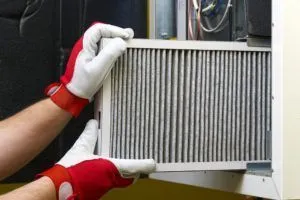
How often should you change your air filter in the winter? Generally, the experts recommend increasing the frequency of filter changes through the winter to keep your indoor air quality (IAQ) at a comfortable level.
You may want to change your filter every month throughout the winter, though the exact schedule for changes depends on your needs. Find out how to determine if your filter needs changing to set your schedule with our team at Ambient Edge.
Do You Need to Change Your Air Filter in the Winter?
Keeping your HVAC system in good condition and your IAQ at acceptable levels requires regular changes to your air filter year-round. Throughout most of the year, the professionals advise changing the filter every three months.
However, the winter months generally come with increased usage of your heating system. As a result, your filter is exposed to more contaminants in this situation, becoming full more quickly and requiring more frequent changes.
In many cases, homeowners have to change their filters every month through the winter to keep everyone working as efficiently as possible.
Do You Really Need to Change Air Filters so Frequently?
Some property owners wonder if they can put off changing their air filters. Keeping a dirty filter in your system has significant downsides. On the other hand, changing your air filters regularly can:
Protect Your HVAC System
Air filters work directly with your heating system in the winter. The filters remove contaminants like:
- Dirt
- Dust
- Pet dander
- Mold spores
- Bacteria
Over time, filters fill up with these substances, blocking the airflow through your HVAC unit. Blocked air flow makes the system work harder, decreasing efficiency and increasing the odds of parts wearing out.
Boost Your IAQ
IAQ refers to the quality of the air you breathe while at home. Filters remove particulates from the air moving through your vent system. Once your filter gets full, dust and debris often get past it, which can lead to respiratory problems like coughing and sneezing.
Lower Your Energy Expenses
Finally, your HVAC system works harder when you have a dirty filter. The system may have to run for longer to heat your home appropriately as it struggles with reduced airflow. The increased operation time often directly contributes to higher energy expenses.
So, how often should you change your air filter in the winter to reap these benefits? Generally, a monthly change can keep your system working well. However, exceptions to this rule exist.
What Factors Contribute to How Often You Change Your Air Filter?
Not every homeowner has to change their filter on the same schedule. Some property owners have to change filters more frequently, while others can stretch the time between swaps because of the conditions at their property.
Factors that determine how often you’ll need to replace your air filter can include the following:
The Design of Your Air Filter
Filters come in different widths, ranging from 1” to 6”. Generally, wider filters can go longer before needing a change. However, your system likely requires filters of a specific width. Using an incorrectly-sized filter can diminish the effectiveness of your heater.
Filters also have different MERV (Minimum Efficiency Reporting Values) ratings, which relate to how well they remove contaminants from the air. Generally, filters with a higher rating remove more particulate matter.
Their increased ability to filter out dust and debris means you have to change higher-rated MERV filters more frequently because they fill up with contaminants more quickly.
The Number of People in Your Home
Larger households generally need to change their air filters more regularly. In addition, each person in your home performs tasks that can contribute to the particulate matter the filter has to remove, increasing the strain on the system.
The Number of Pets You Have
Each pet you have can decrease the lifespan of your air filter. Pets shed and drop dander, with hair and other particles getting caught in the filter. Therefore, we recommend checking your filter more frequently if you have a dog, cat, or another furry friend.
Outdoor Air Quality
The pollution levels around your home may influence the lifespan of your air filter. Homes near construction sites, for example, often have to change their filters more regularly because dust from heavy machinery gets into their HVAC units.
How do You Know When to Change Your Air Filter in the Winter?
Planning to change your filter every month during the winter can give you a reasonable estimate for this piece of maintenance. However, you may also notice signs that you need to change your filter more frequently.
For example, you may notice:
- Strange smells coming from your vents when the heater runs
- Your heater running for longer than it usually does
- Signs of dust and dirt on the filter
Generally, it’s relatively easy to locate and check your air filter. If the filter appears caked with dirt and dust after you check it, change it, even if it hasn’t been an entire month.
Can You Make Your Filters Last Longer in the Winter?
Reducing the dust and particles in your home may help your filter last longer. Many property owners see an improvement after they have their HVAC vents professionally cleaned, which removes the dust, mold, and bacteria that can build up through the system over time.
Vacuuming more frequently or adding an air purification system may also increase the life of your filters. You can find out more with an HVAC professional.
Speak to Us About Changing Your Air Filter in the Winter
Our team at Ambient Edge can change your air filter during regular HVAC maintenance. We also take care of duct cleaning for our clients in Nevada and Arizona. Find out more about our services by calling or completing our online contact form.



